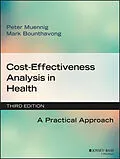The field's bestselling reference, updated with the latest tools, data, techniques, and the latest recommendations from the Second Panel on Cost-Effectiveness in Health and Medicine
Cost-Effectiveness Analysis in Health is a practical introduction to the tools, methods, and procedures used worldwide to perform cost-effective research. Covering every aspect of a complete cost-effectiveness analysis, this book shows you how to find which data you need, where to find it, how to analyze it, and how to prepare a high-quality report for publication. Designed for the classroom or the individual learner, the material is presented in simple and accessible language for those who lack a biostatistics or epidemiology background, and each chapter includes real-world examples and "tips and tricks" that highlight key information. Exercises throughout allow you to test your understanding with practical application, and the companion website features downloadable data sets for students, as well as lecture slides and a test bank for instructors. This new third edition contains new discussion on meta-analysis and advanced modeling techniques, a long worked example using visual modeling software TreeAge Pro, and updated recommendations from the U.S. Public Health Service's Panel on Cost-Effectiveness in Health and Medicine. This is the second printing of the 3rd Edition, which has been corrected and revised for 2018 to reflect the latest standards and methods.
Cost-effectiveness analysis is used to evaluate medical interventions worldwide, in both developed and developing countries. This book provides process-specific instruction in a concise, structured format to give you a robust working knowledge of common methods and techniques.
* Develop a thoroughly fleshed-out research project
* Work accurately with costs, probabilities, and models
* Calculate life expectancy and quality-adjusted life years
* Prepare your study and your data for publication
Comprehensive analysis skills are essential for students seeking careers in public health, medicine, biomedical research, health economics, health policy, and more. Cost-Effectiveness Analysis in Health walks you through the process from a real-world perspective to help you build a skillset that's immediately applicable in the field.
Autorentext
PETER MUENNIG, MD, MPH, is a professor in the Department of Health Policy and Management at Columbia University.
MARK BOUNTHAVONG, PharmD, MPH is a pharmacoeconomist at the Veterans Affairs San Diego Health Care System and an adjunct faculty member of the Skaggs School of Pharmacy and Pharmaceutical Sciences at the University of California, San Diego.
Klappentext
The Bestselling Reference, Updated with the Latest Tools, Data, and Techniques
Now in its third edition, the revised and updated Cost-Effectiveness Analysis in Health: A Practical Approach offers a comprehensive resource for evaluating the interventions and programs that are designed to improve health. Step by step, the authors reveal how to conduct practical cost-effectiveness analyses that has worldwide applications. Without relying on abstract theory or complicated models, Cost-Effectiveness Analysis in Health shows how to work with the fundamentals. The authors offer the information needed to develop a research question, find and evaluate data, build a decision model, stress-test the model, interpret the results, and summarize the findings in a report using the most up-to-date techniques and software.
The text's illustrative exercises provide a guide through the process of obtaining electronic data, analyzing the medical literature, building a decision analysis tree, and conducting a sensitivity analysis.
Cost-Effectiveness Analysis in Health includes:
- The principles of cost-effectiveness analysis
- The eight steps to a perfect research project
- Tools for evaluating the interventions and programs meant to improve health
- A review of probabilities and decision analysis models
- A basic introduction to biostatistics and epidemiology
- Information for preparing your study for publication
The revised edition of Cost-Effectiveness Analysis in Health gives students a basic understanding of and the tools needed to conduct cost-effectiveness analysis.
Inhalt
List of Tables, Figures, and Exhibits xi
Preface xxi
Acknowledgments xxv
About the Author xxvii
Chapter 1 Introduction to Cost-Effectiveness 1
Learning Objectives 1
Overview 1
Why Cost-Effectiveness Is Useful 2
Elements of Cost-Effectiveness Analysis 4
The Average and Incremental Cost-Effectiveness Ratio 9
Why Conduct Cost-Effectiveness Analysis? 11
The Reference Case Analysis 14
Cost-Effectiveness Analysis and Policy 17
Summary 24
Further Readings 24
References 25
Chapter 2 Principles of Cost-Effectiveness Analysis 29
Learning Objectives 29
Overview 29
The Perspective of a Cost-Effectiveness Analysis 29
Capturing Costs 33
Capturing Quality 35
Interpreting the Cost-Effectiveness Ratio 39
Types of Economic Analysis 43
Summary 48
Further Readings 49
References 49
Chapter 3 Developing a Research Project 53
Learning Objectives 53
Overview 53
Eight Steps to a Perfect Research Project 53
Developing a Research Question 55
Designing Your Analysis 64
Summary 70
Further Readings 70
References 70
Chapter 4 Working with Costs 73
Learning Objectives 73
Overview 73
Opportunity Costs 74
Identifying Costs 77
Micro-Costing and Gross Costing 80
Getting Cost Data 82
Using Diagnosis Codes 84
Adjusting Costs 86
Costs Associated with Pain and Suffering 95
Assessing the ''Relevancy'' of Cost Data 97
Other Cost Considerations 98
Summary 102
Further Readings 103
References103
Chapter 5 Probabilities and Decision Analysis Models 105
Learning Objectives 105
Overview 105
The Idea Behind Decision Analysis 105
Probabilities 109
Decision Analysis Models 114
Summary 131
Further Reading 132
References 132
Chapter 6 Calculating Life Expectancy 135
Learning Objectives 135
Overview 135
Hand-Calculating Years Gained 135
Calculating Life-Years Lost Using Markov Models 140
Summary 150
Further Readings 151
References 151
Chapter 7 Working with Health-Related Quality-of-Life Measures 153
Learning Objectives 153
Overview 153
Framework 154
Deriving HRQL Scores 158
Other Considerations and Reminders 168
Using Disability-Adjusted Life-Years 171
Summary 172
Further Readings 173
References 173
Chapter 8 Calculating QALYs 177
Learning Objectives 177
Overview 177
Using the Summation Method 178
Using the Life Table Method 180
More On Discounting 189
Issues with QALYs 191
Calculating Incremental Cost-Effectiveness 192
Disability-Adjusted Life-Year (DALY) 195
Summary 196
Further Readings 196
References 196
Chapter 9 Conducting a Sensitivity Analysis 199
Learning Objectives 199
Overview 199
Performing a Sensitivity Analysis 199
Sensitivity Analysis 201
One-Way Sensitivity Analysis 203
Two-Way Sensitivity Analysis 207
Tornado Diagram 208
Multiway Sensitivity Analysis 210
Summary 222
Further Readings 222
Referen…
